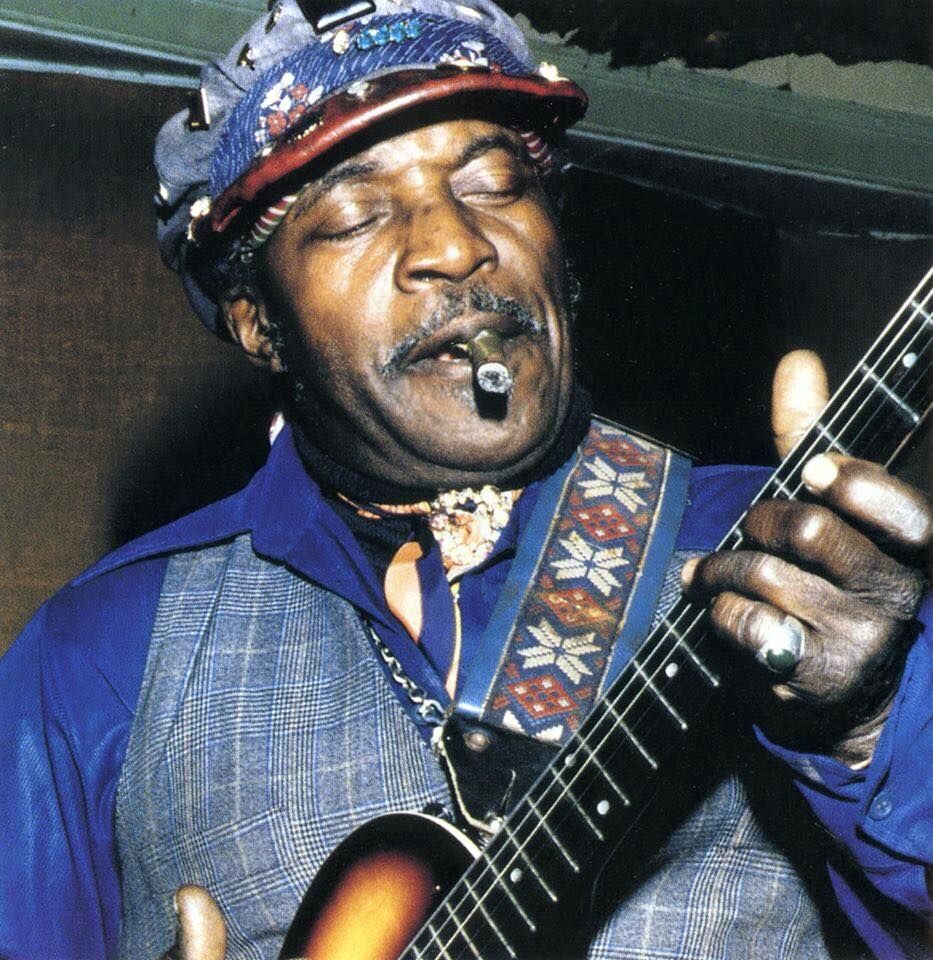2011 Honoree
(1923-2011)

World-renowned blues legend Eddie Kirkland gave his life, heart and soul to crafting and performing his unique brand of blues. Although often cited for the originality of his wailing guitar riffs, raw funky grooves, unique guitar tunings, slide guitar virtuosity, outstanding song writing and harmonica playing, he never fully received the recognition or financial success his great talent deserved. His wandering life style and relentless touring schedule earned him the nickname “Gypsy of the Blues.” In the tradition of great blues artists, he was known for his powerful stage presence and wild appearance that included capes, jump suits and a turban style headdress. His high-energy show integrated such stage antics as acrobatic back flips and playing his guitar behind his back.
Despite a larger than life public personality, there are many unknowns in the details of Kirkland’s life. While he often claimed to have been born in Jamaica on August 16, 1923, the precise date and place of his birth remains the subject of much controversy. It is known that by age one, Kirkland was living together with his young mother, Dixie Rainey, on the Kirkland plantation in Henry County, Alabama. They resided with Mamie Kirkland, his foster grandmother, who raised them together as siblings. Kirkland reminisced how, on most Sundays, Mamie Kirkland brought him to sing in the local sanctified church choir. Besides gospel music, Mamie also exposed Kirkland to a wide range of country, classical and blues music through her extensive 78 record collection she played to him on a wind up record player. Kirkland said “there is soul in all music and I listened to it all.”
Growing up poor in the Jim Crow south, young Kirkland rarely attended school and remembered more often working alongside his young mother picking cotton. Later on, his mother married Jim “Mack” Brown, a sharecropper and blues musician. His step-father played local juke joints and house parties and gave Kirkland his first harmonica and guitar lessons. After Mack and Dixie separated, the young Kirkland made his first guitar using a cigar box, adding screen door wire for strings, and by age 9, he had saved enough money from picking cotton to buy his first Stella guitar. By 1930, the family had moved to Dothan, Alabama where Kirkland reported finding a rich blues scene that included street musicians, juke joints and backwoods house parties. Kirkland cited local musicians as amongst his biggest influences including: Dothan’s trio of brothers, Jewell, Martin and Ray Snell, Stop and Fixit, the traveling guitar duo, and local musician, Blind Murphy. It is clear that these Wiregrass roots were an essential influence on his artistic sensibilities and a testimony to Alabama’s early and rich blues culture.
At age twelve, Kirkland described stowing away with the Silas Green’s Sugar Girls medicine show, performing alongside entertainers like “Diamond Tooth Mary” McLean (Bessie Smiths step-sister) and Butter Beans and Susie. By 1942, he was living in Detroit, where he joined, toured and recorded with John Lee Hooker. Kirkland continued to work in and outside music, with short stints in the army, boxing, and on the Ford Motor Co assembly line. He also returned to Dothan often to visit family and friends and to perform. In 1961, he recorded his first successful solo album on Blank Records, titled It’s the Blues Man.
Eddie moved to Macon, Georgia in 1962, where he joined Otis Redding as a performer and bandleader (1963-66). He recorded with Stax/Volt Records and had a hit single “The Hawg” in 1963. He also toured extensively with numerous well-known musicians, including Muddy Waters, Honeyboy Edwards, Ruth Brown, Little Richard and Johnny Taylor. His extensive and critically acclaimed discography includes albums with many record labels, such as King, Prestige, Lupine, JSP, Deluge, Telarc, RPM, Fortune Records, and Capricorn Records.
Summarizing his undying belief in the transformative power of the blues, Kirkland stated, “My life is the blues, the way I was born, the way I came up, the way I have to live on the road. I’m the poorest blues singer in the world but I love it . . . Sometime in your life you are going to need the blues. Listening to the blues’ll help you overcome your troubles. As long as people have troubles, I will still be playing the blues.”
Kirkland remained dedicated to the blues life and continued to tour, write, record, play juke joints, backwater bars as well as international stages until his untimely death – Eddie Kirkland died in Tampa, Florida, on February 27, 2011, on his way home from a gig.


